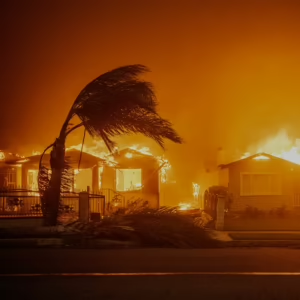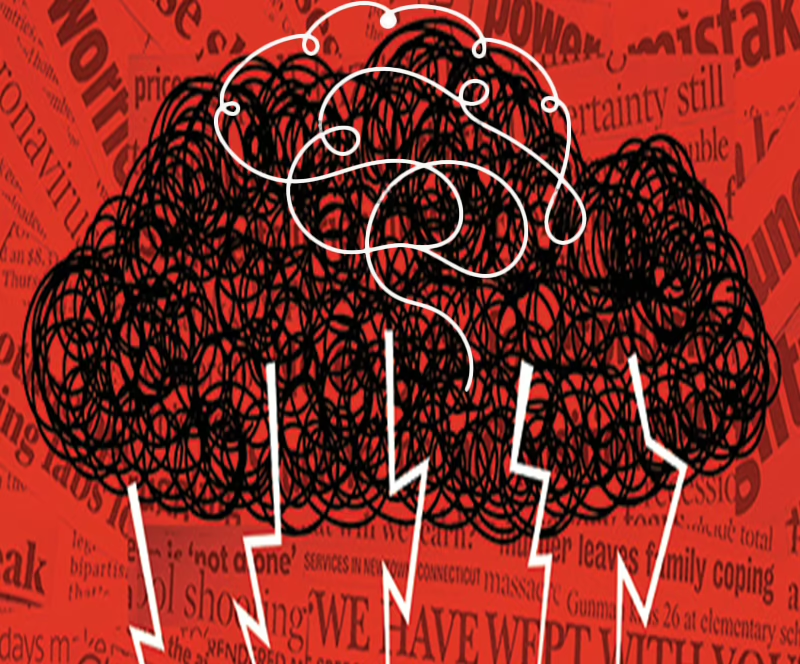The Los Angeles Wildfires: Impact, Aftermath, Self-Care & Community Resources

Igniting on January 7th of the new year, a series of catastrophic wildfires have spread through the Los Angeles area, causing widespread destruction. As of now, we know of at least 10 fatalities and estimate that over 10,000 structures have been destroyed. Areas that were heavily impacted include the Palisades, Eaton, and Hurst – collectively resulting in the razing of over 34,000 acres and the evacuation of 180,000 residents. The blaze is believed to have been set by the Santa Ana winds (reaching over 100mph) paired with ongoing problematic drought conditions. The fires have overwhelmed local resources, leading to the devastation spreading across multiple communities. The federal government has declared this a major disaster in the hopes of facilitating support for the affected regions.
It comes as no surprise that such a catastrophic event such as this one can take a toll on both an individual and community level, but we often don’t talk about how such an event can affect us on a larger, even national scale. Watching these events on the news can be unsettling and stressful and spark anxiety, even for those who have not been directly impacted.
Coping with a high stress event such as a wildfire can feel overwhelming, but it’s important to take things one step at a time and give yourself some grace. Grief, fear, anger, worry or numbness are all emotions that fall within the norm of what you might experience during such an event. Sharing your feelings with trusted friends or family can be helpful in beginning to process what you’re experiencing. Suppressing your emotions during this stressful time may seem like a good idea in the moment, but may only make things harder to manage in the long run. If you’re not ready to talk, journaling or drawing may help you to identify your thoughts. Remember, it’s okay not to feel okay; your focus should be on progress, not perfection.
During this time, it’s important to give yourself breaks to do something that grounds you. Going for a walk, playing soothing music, cuddling with your pets…whatever gives you a moment of peace. Surround yourself with your community: local organizations or neighbors can provide support, and you might find comfort in helping others who are going through a similar experience. Practice self-care in small ways: eating nutritious meals when possible, sticking to your sleep schedule. It’s easy to let routines slide in a moment of crisis, but even small steps toward normalcy can be incredibly healing. Above all, remind yourself that you are resilient, and while the road ahead might be long, you’re not walking it alone.
If you or a loved one has been impacted by the Los Angeles wildfires, here are some resources:
- The Los Angeles County ACCESS Center remains open and operational. The center can be reached at 1-800-854-7771.
- The 988 Suicide and Crisis hotline can be reached by calling or texting 988.
- The Jewish Federation Los Angeles is offering mental health services, warm meals, shelter and space for displaced individuals, families and institutions.
- The Los Angeles County Department of Mental Health Resources has compiled a list of mental health resources to aid people affected by the wildfires.
- The California Department of Public Health is offering tips on how people can cope with loss, talk to their children about wildfires, and more.
If you’d like to get involved in providing aid to those affected by the wildfires, here are some ways you can help by supporting relief efforts (pulled from the LA Times – head over to their website for an even more comprehensive list):
American Red Cross
What it does: The American Red Cross is working alongside its partners to provide shelter, food, emotional support and health services.
How you can help: You can support the Red Cross by making a donation online, by calling (800) 733-2767 or texting REDCROSS to 90999. Website: redcross.org/la
California Fire Foundation
What it does: The foundation is working with local fire agencies and community organizations to support residents impacted by the blazes.
How you can help: An online donation to the California Fire Foundation Wildfire and Disaster Relief Fund directly supports victims of wildfires and disasters throughout California, including the L.A. County area. Website: calfund.org/wildfire-relief-fund
Canine Rescue Club
What it does: The Canine Rescue Club is a network of caregivers who foster dogs awaiting their forever home.
How you can help: The club is looking for volunteers to offer temporary foster care for dogs displaced by the fires. You can apply to temporarily house an affected dog by filling out an online form. Website: www.caninerescue.club/donate
GoFundMe
What it does: GoFundMe has created a centralized online hub housing all verified fundraising pages related to the wildfires. The hub will be updated with accounts as they are verified by the GoFundme team. At the top of the hub is also GoFundMe’s Wildfire Relief Fund 2025.
How you can help: Monetary donations help deliver cash grants directly to those impacted by fires. The GoFundMe team identifies verified individuals who qualify and are fundraising either for themselves or on someone else’s behalf. The team may also provide grants to fundraisers benefiting small businesses and community relief efforts, or to vetted nonprofits coordinating long-term recovery. Website: www.gofundme.com/f/la-wildfires-support-recovery-efforts
Salvation Army
What it does: The Salvation Army Southern California Division is working with government and nongovernment agencies to provide food, personal necessities and shelter to survivors and first responders.
What you can do: The Salvation Army is currently accepting donations through the Emergency Disaster Fund to help meet the urgent need across Southern California. Monetary donations can be made online, checks can be mailed to “The Salvation Army – Disaster Relief” at P.O. Box 93002, Long Beach 90809-9355. Website: http://socal.salvationarmy.org/southern-california/wildfires-in-los-angeles/
World Central Kitchen
What it does: World Central Kitchen’s relief team is in Southern California to support first responders and families affected by the fires, providing nourishing meals to people in need.
How you can help: You can help by making an online donation on their website. Website: www.wck.org/news/first-alert-ca-fires-jan25
Community Organized Relief Effort (CORE)
What it does: CORE is deploying an emergency response team to support those where air quality is a major concern. It is supplying emergency go-bags, masks and other protective equipment while providing information about evacuations and shelter support.
How you can help: You can support CORE’s efforts by making an online donation on their website. Website: www.coreresponse.org
Stay safe, take care and remember: you are not alone
Bianca Massi, LMHC
Assisted Psychotherapist

